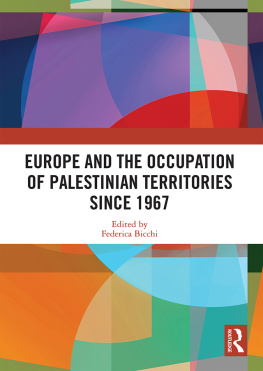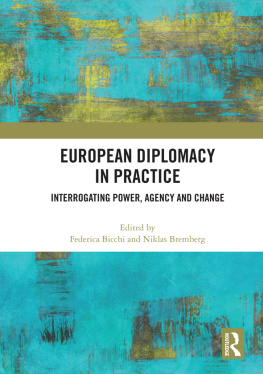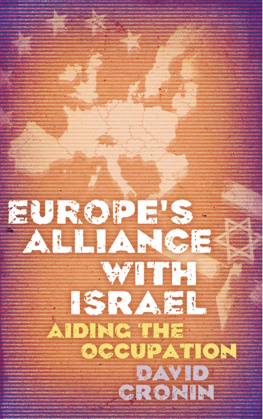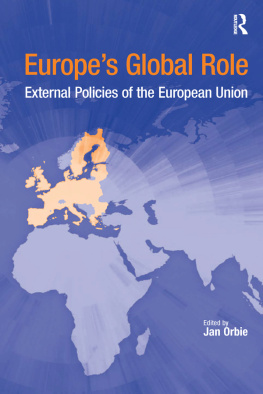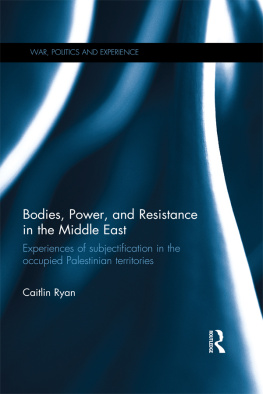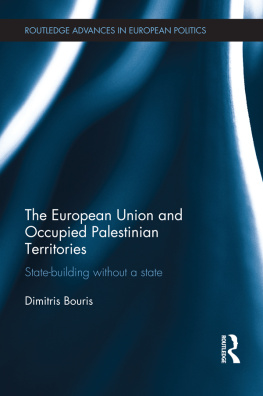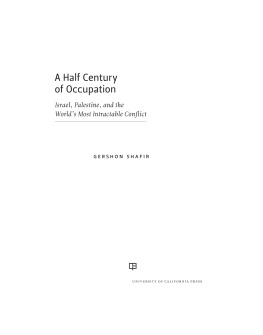Europe and the Occupation of Palestinian Territories Since 1967
Focusing on key countries and topics, this book looks at Europes involvement in the occupation of Palestinian territories.
What has been Europes role in the occupation of Palestinian territories since 1967? How have European actors responded, countered and/or supported the occupation? The international context of this exceptionally long occupation shows a complex web of denunciations, but also and especially complicit engagements and indifference. The book looks at the perspective of international law, before analysing the European Union and key European countries (France, Germany, Norway, Sweden, United Kingdom). It also embraces different perspectives, from the debate on campus to the role of European multinational companies to the conceptual approach of the World Bank. While much of the literature focuses on Israel, Palestine and the United States, this volume by leading experts adds a very important piece to the puzzle: the European dimension.
The chapters in this book were originally published as a special issue of the journal, Global Affairs.
Federica Bicchi is Associate Professor in International Relations of Europe in the Department of International Relations, London School of Economics, UK.
Europe and the Occupation of Palestinian Territories Since 1967
Edited by
FedericaBicchi
First published 2021
by Routledge
2 Park Square, Milton Park, Abingdon, Oxon, OX14 4RN
and by Routledge
52 Vanderbilt Avenue, New York, NY 10017
Routledge is an imprint of the Taylor & Francis Group, an informa business
2021 European International Studies Association
All rights reserved. No part of this book may be reprinted or reproduced or utilised in any form or by any electronic, mechanical, or other means, now known or hereafter invented, including photocopying and recording, or in any information storage or retrieval system, without permission in writing from the publishers.
Trademark notice: Product or corporate names may be trademarks or registered trademarks, and are used only for identification and explanation without intent to infringe.
British Library Cataloguing-in-Publication Data
A catalogue record for this book is available from the British Library
ISBN13: 978-0-367-54226-9
Typeset in Minion Pro
by codeMantra
Publishers Note
The publisher accepts responsibility for any inconsistencies that may have arisen during the conversion of this book from journal articles to book chapters, namely the inclusion of journal terminology.
Disclaimer
Every effort has been made to contact copyright holders for their permission to reprint material in this book. The publishers would be grateful to hear from any copyright holder who is not here acknowledged and will undertake to rectify any errors or omissions in future editions of this book.
Contents
Federica Bicchi
Michael Lynk
Valentina Azarova
Benedetta Voltolini
Jan Busse
Federica Bicchi
Jacob Eriksson
Michelle Pace
Mary Martin
Jeremy Wildeman
Guide
The chapters in this book were originally published in the Global Affairs, volume 4, issue 1 (September 2018). When citing this material, please use the original page numbering for each article, as follows:
Chapter 1
The Occupation of Palestinian territories since 1967: an analysis of Europes role
Federica Bicchi
Global Affairs, volume 4, issue 1 (September 2018) pp. 3-5
Chapter 2
The challenge for Europe: making international law work for Middle East peace
Michael Lynk
Global Affairs, volume 4, issue 1 (September 2018) pp. 7-21
Chapter 3
The secret life of non-recognition: EU-Israel relations and the obligation of non-recognition in international law
Valentina Azarova
Global Affairs, volume 4, issue 1 (September 2018) pp. 23-37
Chapter 4
France and the Israeli occupation: talking the talk, but not walking the walk?
Benedetta Voltolini
Global Affairs, volume 4, issue 1 (September 2018) pp. 51-63
Chapter 5
Germany and the Israeli occupation: the interplay of international commitments and domestic dynamics
Jan Busse
Global Affairs, volume 4, issue 1 (September 2018) pp. 77-88
Chapter 6
The debate about the occupation of Palestinian territories on UK campuses, from politicization to re-writing the rules
Federica Bicchi
Global Affairs, volume 4, issue 1 (September 2018) pp. 89-100
Chapter 7
Swedish recognition of Palestine: politics, law, and prospects for peace
Jacob Eriksson
Global Affairs, volume 4, issue 1 (September 2018) pp. 39-49
Chapter 8
Norways ambiguous approach towards Israel and Palestine
Michelle Pace
Global Affairs, volume 4, issue 1 (September 2018) pp. 65-76
Chapter 9
Missing the train. International governance gaps and the Jerusalem Light Railway
Mary Martin
Global Affairs, volume 4, issue 1 (September 2018) pp. 101-114
Chapter 10
EU Development aid in the occupied Palestinian territory, between aid effectiveness and World Bank guidance
Jeremy Wildeman
Global Affairs, volume 4, issue 1 (September 2018) pp. 115-128
For any permission-related enquiries please visit:
http://www.tandfonline.com/page/help/permissions
Valentina Azarova Center for Global Public Law, Ko University Law School, Istanbul, Turkey.
Federica Bicchi Department of International Relations, London School of Economics, UK.
Jan Busse Institute of Political Science, Bundeswehr University Munich, Neubiberg, Germany.
Jacob Eriksson Department of Politics, University of York, York, UK.
Michael Lynk Faculty of Law, Western University, London, Canada. UN Special Rapporteur for the situation of human rights in the Palestinian territories.
Mary Martin London School of Economics, London, UK.
Michelle Pace Department of Social Sciences and Business, Roskilde University, Denmark.
Benedetta Voltolini Department of European and International Studies, Kings College London, London, UK..
Jeremy Wildeman Department of Social and Policy Sciences, University of Bath, UK.
Federica Bicchi
The issue at stake
50+ years of Israeli occupation of Palestinian territories have not existed in a vacuum. While much of the scholarly attention has scrutinized dynamics on the ground, the international context within which the occupation has persisted deserves equal scrutiny beyond the traditional reference to US foreign policy, because the sustainability of regional phenomena depends also on the international context within which they are embedded. This forum focuses on European actors and how they have interacted with the occupation, through an analysis of legal, political and socio-economic practices. It shows that the Israeli-Palestinian conflict has been played out not only in the foreign policies of European countries and organizations, but also and increasingly in their domestic politics, policies and debates. The aim of this brief introduction is to highlight the main points and anticipate some of the key themes that weave the collection together, in terms of substance and scope.

